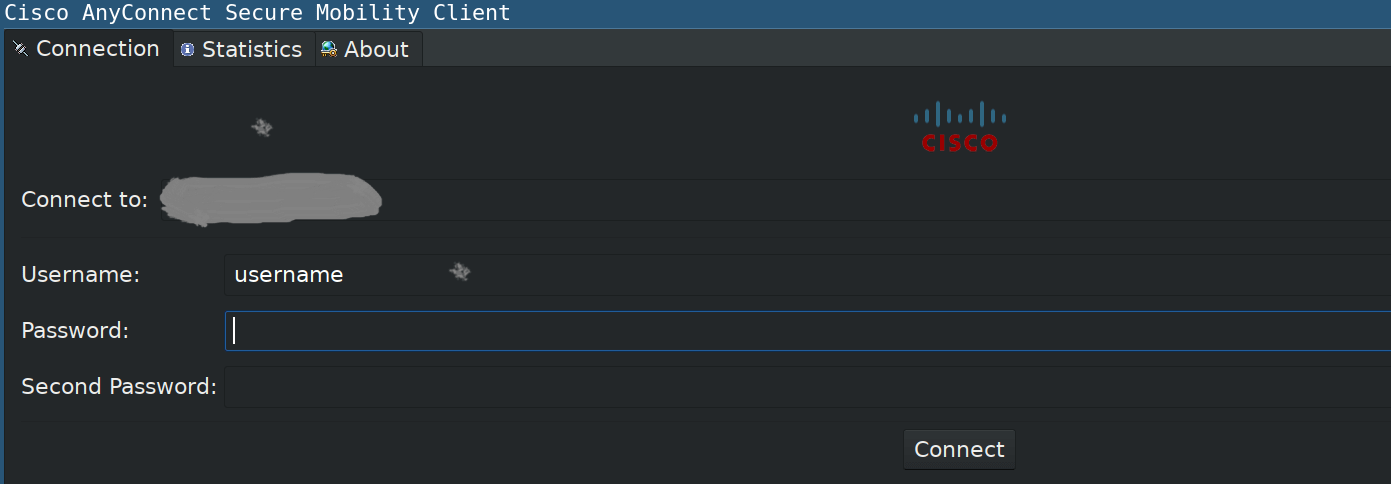- Cisco Anyconnect Openconnect Login
- Ubuntu Cisco Anyconnect Openconnect
- Cisco Anyconnect Ubuntu Openconnect
- Cisco Anyconnect Compatible Vpn (openconnect)
OpenConnect is a cross-platform multi-protocol SSL VPN client which supports a number of VPN protocols:
I currently have and use the official Cisco AnyConnect Client. When I connect to it all it asks me for is my username and password. When I try to connect to the same server using the package from network-manager-openconnect-gnome it looks like this. Sep 04, 2014 Cisco AnyConnect VPN with openvpn & openconnect I was looking for an alternative to Cisco AnyConnect VPN client for my Ubuntu box. The official client is a JAVA one and I am not interested in installing JAVA on my lean Ubuntu installation. Installing the OpenConnect VPN Server (ocserv) on CentOS 8. Connect to the CentOS 8 server via.
- Cisco AnyConnect (--protocol=anyconnect)
- Juniper SSL VPN (--protocol=nc)
- Pulse Connect Secure (--protocol=pulse
- Palo Alto Networks GlobalProtect SSL VPN (--protocol=gp)
- F5 Big-IP SSL VPN (--protocol=f5)
- Fortinet Fortigate SSL VPN (--protocol=fortinet)
OpenConnect is not officially supported by, or associated in any waywith Cisco Systems, Juniper Networks, Pulse Secure, Palo Alto Networks, F5,or Fortinet, or any of the companies whose protocols we may support in the future.It just happens to interoperate with their equipment. Trademarks belong totheir owners in a rather tautological and obvious fashion.
An openconnect VPN server (ocserv), which implementsan improved version of the Cisco AnyConnect protocol, has also beenwritten.
OpenConnect is released under the GNU Lesser Public License, version 2.1.
Motivation
Development of OpenConnect was started after a trial of the Cisco AnyConnectclient under Linux found it to have many deficiencies:
- Inability to use SSL certificates from a TPM or PKCS#11 smartcard, or even use a passphrase.
- Lack of support for Linux platforms other than i386.
- Lack of integration with NetworkManager on the Linux desktop.
- Lack of proper (RPM/DEB) packaging for Linux distributions.
- 'Stealth' use of libraries with dlopen(), even using the development-only symlinks such as libz.so — making it hard to properly discover the dependencies which proper packaging would have expressed
- Tempfile races allowing unprivileged users to trick it into overwriting arbitrary files, as root.
- Unable to run as an unprivileged user, which would have reduced the severity of the above bug.
- Inability to audit the source code for further such 'Security 101' bugs.
Naturally, OpenConnect addresses all of the above issues, and more.
New protocols
Adding new protocols to OpenConnect is relatively simple, andadditional protocols have been added over the years since usingOpenConnect allows a developer to concentrate on the protocol itselfand most of the boring details about platform-specific tunnel managementand IP configuration, and handling of client SSL certificates, are alreadyresolved.
If you have a protocol which you think it makes sense to support inOpenConnect, especially if you are able to help with interoperabilitytesting, please file an issuein GitLab.
Consistent multi-protocol support
Wherever possible, OpenConnect presents a uniform API and command-lineinterface to each of these VPNs. For example,openconnect --force-dpd=10will attempt dead peer detection every 10 seconds on every VPN thatsupports it, even though the actual mechanism used may be protocol-specific.Protocol-specific features and deficiencies are described on theindividual protocol pages.
| Original author(s) | David Woodhouse |
|---|---|
| Developer(s) | Daniel Lenski, Nikos Mavrogiannopoulos |
| Initial release | March 18, 2009[1] |
| Stable release | |
| Repository | |
| Type | VPN |
| License | GNU LGPL v2.1[2] |
| Website | www.infradead.org/openconnect/ |
Cisco Anyconnect Openconnect Login
OpenConnect is an open-source software application for connecting to virtual private networks (VPN), which implement secure point-to-point connections.
It was originally written as an open-source replacement for Cisco's proprietaryAnyConnect SSL VPN client,[3] which is supported by several Cisco routers.The OpenConnect client added support for Juniper Networks' SSL VPN in version 7.05,.[1] A fork then developed support for Palo Alto Networks' GlobalProtect VPN,[4] which was included in the version 8.00 release.[5]
Server[edit]
As of 2013, the OpenConnect project also offers an AnyConnect-compatible server, ocserv,[6] and thus offers a full client-server VPN solution.
OpenConnect and ocserv now implement an extended version of the AnyConnect VPN protocol, which has been proposed as an Internet Standard.[7] Both OpenConnect and ocserv strive to maintain backwards-compatibility with Cisco AnyConnect servers and clients.
Protocols[edit]
Cisco AnyConnect[edit]
Cisco AnyConnect VPNs utilize TLS to authenticate and configure routing, then DTLS to efficiently encrypt and transport the tunneled VPN traffic,[8][9] and can fall back to TLS-based transport where firewalls block UDP-based traffic. The DTLS protocol used by Cisco AnyConnect servers was based on a non-standard, pre-release draft of DTLS 1.0, until support for the DTLS 1.2 standard was added in 2018.[9][10]
OpenConnect's implementation of the AnyConnect protocol is sufficiently complete that some of Cisco's own IP phone devices embed a very old release of OpenConnect[11] (rather than Cisco's own proprietary software) in order to be able to connect to Cisco SSL VPNs.[12][13]
DTLS[edit]
Cisco's proprietary AnyConnect clients and servers were originally built against a patched, 2007 release of OpenSSL 0.9.8f,[14] which implemented a pre-release version of DTLS that was not compatible with DTLS 1.0 as standardized in RFC 4347. Because of this, it was difficult to make OpenConnect implement a Cisco-compatible version of DTLS without linking against OpenSSL.
Explicit support for Cisco's non-standard version of DTLS was included in OpenSSL 0.9.8m (where it is known as DTLS1_BAD_VER) and then GnuTLS 3.2.1 (where it is known as GNUTLS_DTLS0_9).[15] Newer versions of Cisco's AnyConnect clients and servers support DTLS 1.2 in its standardized on-the-wire form (RFC 6347), though they continue to use a non-standard mechanism (based on session resumption) for DTLS key exchange.[7]
Modern versions of OpenConnect can be built to use either the GnuTLS or OpenSSL for TLS, DTLS, and cryptographic primitives.
Other protocols[edit]
The OpenConnect client also implements Juniper, Junos Pulse, and GlobalProtect VPN protocols. These have a very similar structure to the AnyConnect protocol: they authenticate and configure routing over TLS, except that they use ESP for efficient, encrypted transport of tunneled traffic (instead of DTLS), but they too can fall back to TLS-based transport.As of May 2020, support for several PPP-based protocols is in development.[16]
Architecture[edit]
The OpenConnect client is written primarily in C, and it contains much of the infrastructure necessary to add additional VPN protocols operating in a similar flow, and to connect to them via a common user interface:[17]
- Initial connection to the VPN server via TLS
- Authentication phase via HTTPS (using HTML forms, client certificates, XML, etc.)
- Server-provided routing configuration, in a protocol-agnostic format, which can be processed by a vpnc-script
- Data transport phase via a UDP-based tunnel (DTLS or ESP), with fallback to a TLS-based tunnel
- Built-in event loop to handle Dead Peer Detection, keepalive, rekeying, etc.
OpenConnect can be built to use either the GnuTLS or OpenSSL libraries for TLS, DTLS and cryptographic primitives.
Platforms[edit]
OpenConnect is available on Solaris, Linux, OpenBSD, FreeBSD, MacOS, and has graphical user interface clients for Windows,[18]GNOME,[19] and KDE.[20] A graphical client for OpenConnect is also available for Android devices,[21]and it has been integrated into router firmware packages such as OpenWrt.[22]
References[edit]

- ^ abcinfradead.org - OpenConnect: Changelog.
- ^gitlab.com - OpenConnect: License.
- ^''Development of OpenConnect was started after a trial of the Cisco client under Linux found it to have many deficiencies …''. Infradead.org. Retrieved 2018-08-13.
- ^dlenski/openconnect on GitHub
- ^'OpenConnect 8.00 release'. Lists.infradead.org. Retrieved 2019-01-05.
- ^ocserv home page.
- ^ abN. Mavrogiannopoulos (October 2018). The OpenConnect VPN Protocol Version 1.1. IETF. I-D draft-mavrogiannopoulos-openconnect-02.
- ^Tiso, John; Scholfield, Mark D.; Teare, Diane (2011). Designing Cisco Network Service Architectures (ARCH): Foundation Learning Guide. Foundation Learning Guides (3 ed.). Cisco Press. p. 464. ISBN9781587142888. Retrieved 2013-06-13.
Cisco AnyConnect is a Cisco implementation of the thick client. Because the SSL VPN network extension runs on top of the SSL protocol, it is simpler to manage and has greater robustness with different network topologies such as firewalls and Network Address Translation (NAT) than the higher security of IPsec.
- ^ abMavrogiannopoulos, Nikos (2013-11-17). 'nmav's Blog: Inside an SSL VPN protocol'. Nmav.gnutls.org. Retrieved 2018-08-13.
- ^'Release Notes for the Cisco ASA Series, 9.10(x)'. Cisco. December 12, 2018.
- ^'ocserv issues #51'.
- ^Nikos Mavrogiannopoulos. 'Recipe: VoIP network with ocserv'.
- ^'Open Source License Notices for the SPA525G'(PDF). Cisco.
- ^David Woodhouse (September 23, 2008). 'DTLS clue requested'.
- ^David Woodhouse. 'How the VPN works § DTLS compatibility'.
- ^https://gitlab.com/openconnect/openconnect/-/issues?label_name%5B%5D=PPP
- ^Daniel Lenski (September 17, 2020). 'How VPNs Work- The Ins and Outs'. DAMA Portland.
- ^'Openconnect graphical client'. GitHub. Retrieved 2014-10-28.
- ^'NetworkManager-openconnect'. gnome.org. Retrieved 2020-01-27.
- ^'NetworkManagement'. kde.org. Retrieved 2014-10-28.
- ^cernekee. 'Android UI for OpenConnect VPN client'. GitHub. Retrieved 2014-10-28.
- ^'VPN Overview'. openwrt.org. Retrieved 2018-03-15.

Ubuntu Cisco Anyconnect Openconnect
External links[edit]
Cisco Anyconnect Ubuntu Openconnect
Some useful usage information.
Cisco Anyconnect Compatible Vpn (openconnect)
